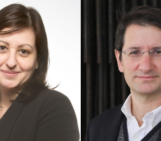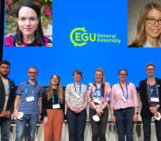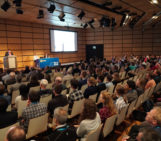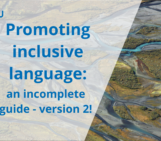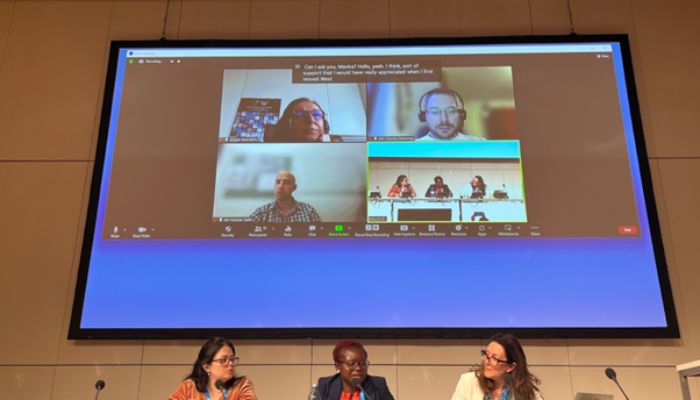
Probably all of us academics have someone outside the office for whom we care, with whom we want to spend our time, and for whom we spend some of our earned money. This time and money shared with people that we care about can become a significant factor that impacts our academic work and even careers. When this is the case, we need to acknowledge to ourselves that we need help, ask for help, and hope that we get it.
Both the short course and the Union Symposia during the recently concluded EGU23 opened my eyes a bit more to the challenges of juggling a career as an academic with extensive caring responsibilities. Like most people, I have had similar experiences. In the summer of 2020, I moved from Norway to Switzerland without a job, to be with and care for my then 4-year old daughter as a single parent. My experiences with fighting an abrupt end to my academic career while caring for my lovely daughter found new perspective as I listen to Lisa Wingate (INRAE, France) taking the stage at the Union Symposia. Lisa outlines her own challenges as an academic mother, who relocated for work multiple times and through multiple countries, in part as a single parent, before she and her partner managed to both find permanent academic positions in the same place. Panellist Marie Cavitte (University Catholique de Louvain, Belgium) even spent two months away from her few-months old son, so she could do important field work in Antarctica. This was only possible thanks to supportive colleagues and the dedicated support of her partner, Brice Van Liefferinge (Norwegian Polar Institute, Norway), who now describes himself as true “Papa Poule”.
When the child caring arrangement for her time away at EGU23 fell through, panellist and single parent Munira Raji (University of Plymouth, UK) flew her autistic son in to Vienna too. Flights are not cheap, particularly when booked last minute. It is an insightful reminder for the hidden costs and resulting financial pressure resulting from a caring situation like Munira‘s.
My phone buzzes and pops up an image of mirrors with the message: “Libe Grüse Von M Für Papa. 🏔️🗻❤️🧡💛💚💙💜🖤🤍🤎💝💖” (Love greetings from M for dad). It is some colourful emoji greeting from my daughter, who stayed with her mum in Switzerland, but kindly thought of her father working on mountains and things. Indeed, it is not only the parents who care. Catherine Booth (Imperial College London, UK) outlines the time she spends, on some days up to six hours, caring for her father in need (while working, of course). If such an effort wouldn’t be enough, she receives many harmful comments from colleagues, who simply lack understanding about her caring responsibility. When her father‘s condition changes, her caring effort changes accordingly. This is, in her view, an important aspect to consider when planning support for academics with caring responsibilities.
After I spent more than a year in a city without a social network during the pandemic, I can relate to the one aspect shared by all participants of the panel before me: extensive caring responsibility is a strongly isolating experience.
Caring duties prevent us from social interaction with colleagues at work, like Friday-evening drinks, group week-end activities, or in-person meetings. This lack of social interaction is particularly harmful for academics in non-permanent positions (i.e., most of us), for whom these connections are the building blocks of a healthy social environment.
It seems important to therefore lower our emphasis on scientific evaluation of an international career across different geographic places. This is a doable step for employers and funding agencies, if they want to support people with caring responsibilities in the future.
As of today, funding agencies apparently have no effective means in place to financially support carers, as Angela Liberatore (ERC, Belgium) outlines. All of the options mentioned during the panel discussion to support principal investigators (PIs) lack a wide enough coverage for the diverse academics with caring responsibility. Moreover, extra financial support by academic funding agencies is currently fully dependent on the specific host institution. That is a problem, when the host institution needs to be justified on a scientific basis in grant proposals. Moreover, in the special cases where financial support is available, most academics in need are not aware of it, as single parent Nir Galili (ETH, Zurich, Switzerland) outlines based on his and his colleague’s experiences.
For this very reason, academics should start budgeting their – and their team members – real costs in academic proposals including expenses arising from care-giving. Funding agencies could support parents now by explicitly using the term “childcare costs” in the project proposal description as part of the eligible costs in tandem with PIs detailing these financial costs in their proposal budgets. Academics with caring responsibilities should further find people that care for them, or with them, and openly share their experiences at their workplace and beyond. Maybe then, we can finally stop asking ourselves questions like: “When is the best time during an academic career to have children?”
Listening to the diverse caring responsibilities and experiences shared by the panel participants, I realise the EGU with its community-led structure can be, and is, such a spearheading institution: Beyond free childcare, EGU23 provided a union-wide session to discuss and raise awareness of this important topic. As EGU General Secretary Jane Hart points out during the Q&A session: “Out of all the sessions I have witnessed, I’ve never seen such a touching and relatable session in a science conference.” And Catherine, who invests so much to care for her father and follow her passion in the geosciences, said it was a truly cathartic experience to talk about her caring responsibility.
Watch the full recorded version of this Union Symposia session, which will be open for on-demand viewing and commenting until 31 May 2023.

